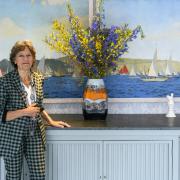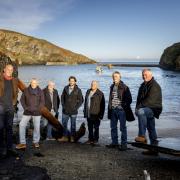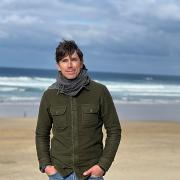If they weren’t so toxic you might think them rather pretty. Certainly the name enchants: mermaids tears. But these little pearls of glimmering plastic that litter our Cornish beaches in their thousands are Andy Cummins’s bête noire. “They are tiny plastic pellets that escape down storm drains from plastic factories. They don’t biodegrade, adsorb harmful chemicals and get eaten by wildlife, who mistake them for fish eggs.” Andy is campaign manager for Surfers against Sewage (SAS) and mermaids tears aren’t the only ‘seaside souvenirs’ that make him cross. Plastic bags, bottles, crisp packets, cigarette butts, fishing line and effluent, Andy hates the lot.

SAS was formed 25 years ago by a group of surfers in St Agnes who got fed up of surfing in waters polluted by sewage. “It was an organization borne out necessity,” says Andy. “Surfers were simply sick of getting sick.” They decided to take regulatory authorities and water companies to task. Innovative campaigning methods such as members wearing gasmasks to the beach and demonstrating outside the Houses of Parliament clad in wetsuits caught the attention of the national media. Within a few months membership had grown exponentially. Today, SAS canvasses on far more than just water quality and is regarded as one of the UK’s leading environmental charities.
In Cornwall, where the coastline exceeds 400 miles and the surfing economy is worth an estimated £64 million annually, campaigning is fervent. This year SAS will continue to raise awareness on the issue of marine litter. “It’s a very visible form of pollution and a real concern for our supporters,” says Andy. A recent report published by the charity reveals that approximately 6.4 million tons of litter ends up in the sea each year, which causes the death of more than one million seabirds and 100,000 mammals annually.
“Pretty shocking, isn’t it,” says Cornish resident Hilary Blythe, who recently attended a beach clean organized by SAS at Perranporth. “I can’t understand why anyone who loves the coast would want to litter it with rubbish. Aside from being unsightly it’s also dangerous.” A pause. “You’d think with all the organizations out there telling us to ‘reduce, reuse and recycle’ people might have got the message – but I think our litter problems are getting worse.”
She might be right. According to SAS, the amount of litter found on our beaches has almost doubled over the last 15 years. Little wonder that the charity is calling for a 50 per cent reduction in marine litter levels by 2020. Can it be achieved? “Absolutely,” says Andy, “It will require positive and collective actions from all sectors: industry, government and the public, but it can be done.”

Water quality remains another key issue for the charity. Although, SAS has significantly improved bathing water quality standards throughout the UK by putting pressure on water companies to invest millions of pounds in sewage infrastructure, our seas are still prone to ‘sewage related incidents’.
“It’s why we launched the Safer Seas Service app,” says Andy. “It warns beach users, in real time, when sewage overflows are discharging onto beaches. People can then make informed decisions about when, where and how they use the sea and avoid contact with harmful pathogens.”
There are over 40 beaches covered by the warning system in Cornwall, including popular spots like Bude, Godrevy and Watergate Bay. “It’s a terrific piece of software,” says coast-lover Hilary Blythe, “Look at this!” She holds up her phone. “Lots of smiley faces in Cornwall, today, which can only mean one thing.” She beams. “Time to get into the water!”
How you can help SAS keep Cornwall’s coast clean.

Andy says there are a number of things Cornwall Life readers can do to improve water quality and reduce the amount of litter in our seas.
Don’t drop litter
Don’t leave rubbish on the beach, toss it from a boat, or litter anywhere. Even rubbish dumped on land can make its way into bodies of water. Always dispose of your rubbish responsibly.

Think FOG
Stop pouring fats, oils and greases down the sink as congealed blocks of fat can cause blockages in the sewage system, resulting in sewage overflows.
Love your loo

Only flush the 3Ps – pee, paper and poo – down your loo and bag and bin wet wipes and sanitary products which block sewers, reducing water treatment efficiency.
Break the bag habit
Pledge to stop using single-use plastic bags and use reusable shopping bags for your groceries.

Help clean our beaches
Get involved in a beach clean. SAS organize them regularly throughout the year. Find out more at www.sas.org.uk



































